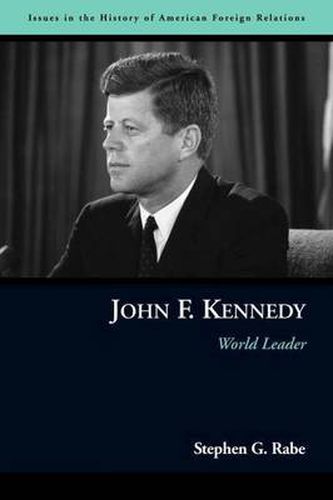Readings Newsletter
Become a Readings Member to make your shopping experience even easier.
Sign in or sign up for free!
You’re not far away from qualifying for FREE standard shipping within Australia
You’ve qualified for FREE standard shipping within Australia
The cart is loading…






President John F. Kennedy remains a subject of fascination for both historians and citizens. Consistently ranked among the most popular U.S. presidents, Kennedy led the country during a time of rapid social change at home punctuated by critical foreign policy crises, among them the Bay of Pigs fiasco in Cuba, the showdown with the Soviet Union over the erection of the Berlin Wall, the Cuban missile crisis, and the escalation of American involvement in Vietnam.
As Stephen G. Rabe explains in this introduction to American foreign policy at the height of the Cold War, Kennedy perceived himself as a foreign policy president. Time and again, the president used the threat of force, good diplomacy, and sound judgment to keep the world from falling into the abyss of nuclear war. But Kennedy did more than manage foreign policy crises. He launched major economic development programs for Latin America, India, and Egypt and dispatched Peace Corps volunteers around the world. He attempted to mediate the Arab-Israeli dispute and to stop the spread of nuclear weapons to China and Israel. Under Kennedy, the United States began for the first time to develop a policy for Africa.
Taking a fresh look at Kennedy’s wide-ranging efforts to change the world, Rabe devotes chapters to U.S. relations with the Soviet Union, Cuba, Latin America, and Vietnam. The author also evaluates Kennedy’s approach to India, China, Egypt, and Israel and such African nations as Algeria, Angola, and South Africa. Rabe concludes by exploring whether Kennedy was contemplating a new approach toward the Soviet Union, one that, had Kennedy lived to see reelection, might have soon ushered in the era of detente.
$9.00 standard shipping within Australia
FREE standard shipping within Australia for orders over $100.00
Express & International shipping calculated at checkout
President John F. Kennedy remains a subject of fascination for both historians and citizens. Consistently ranked among the most popular U.S. presidents, Kennedy led the country during a time of rapid social change at home punctuated by critical foreign policy crises, among them the Bay of Pigs fiasco in Cuba, the showdown with the Soviet Union over the erection of the Berlin Wall, the Cuban missile crisis, and the escalation of American involvement in Vietnam.
As Stephen G. Rabe explains in this introduction to American foreign policy at the height of the Cold War, Kennedy perceived himself as a foreign policy president. Time and again, the president used the threat of force, good diplomacy, and sound judgment to keep the world from falling into the abyss of nuclear war. But Kennedy did more than manage foreign policy crises. He launched major economic development programs for Latin America, India, and Egypt and dispatched Peace Corps volunteers around the world. He attempted to mediate the Arab-Israeli dispute and to stop the spread of nuclear weapons to China and Israel. Under Kennedy, the United States began for the first time to develop a policy for Africa.
Taking a fresh look at Kennedy’s wide-ranging efforts to change the world, Rabe devotes chapters to U.S. relations with the Soviet Union, Cuba, Latin America, and Vietnam. The author also evaluates Kennedy’s approach to India, China, Egypt, and Israel and such African nations as Algeria, Angola, and South Africa. Rabe concludes by exploring whether Kennedy was contemplating a new approach toward the Soviet Union, one that, had Kennedy lived to see reelection, might have soon ushered in the era of detente.